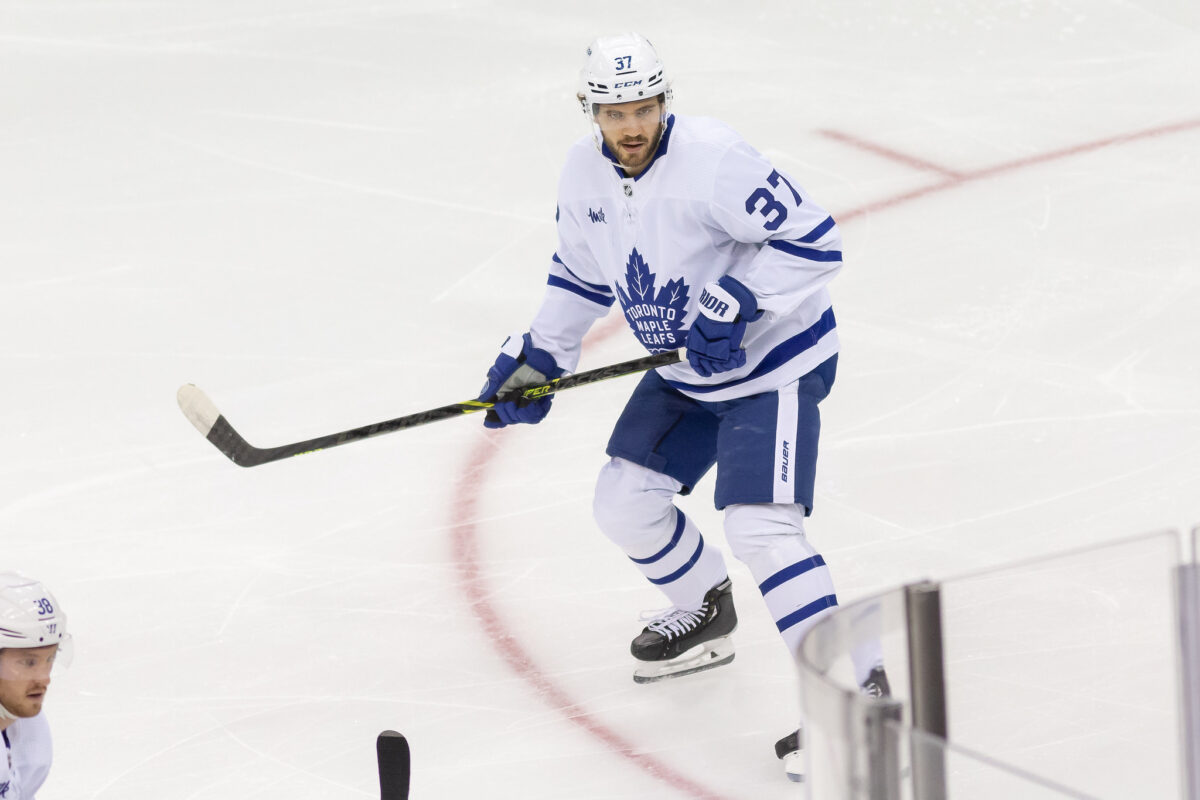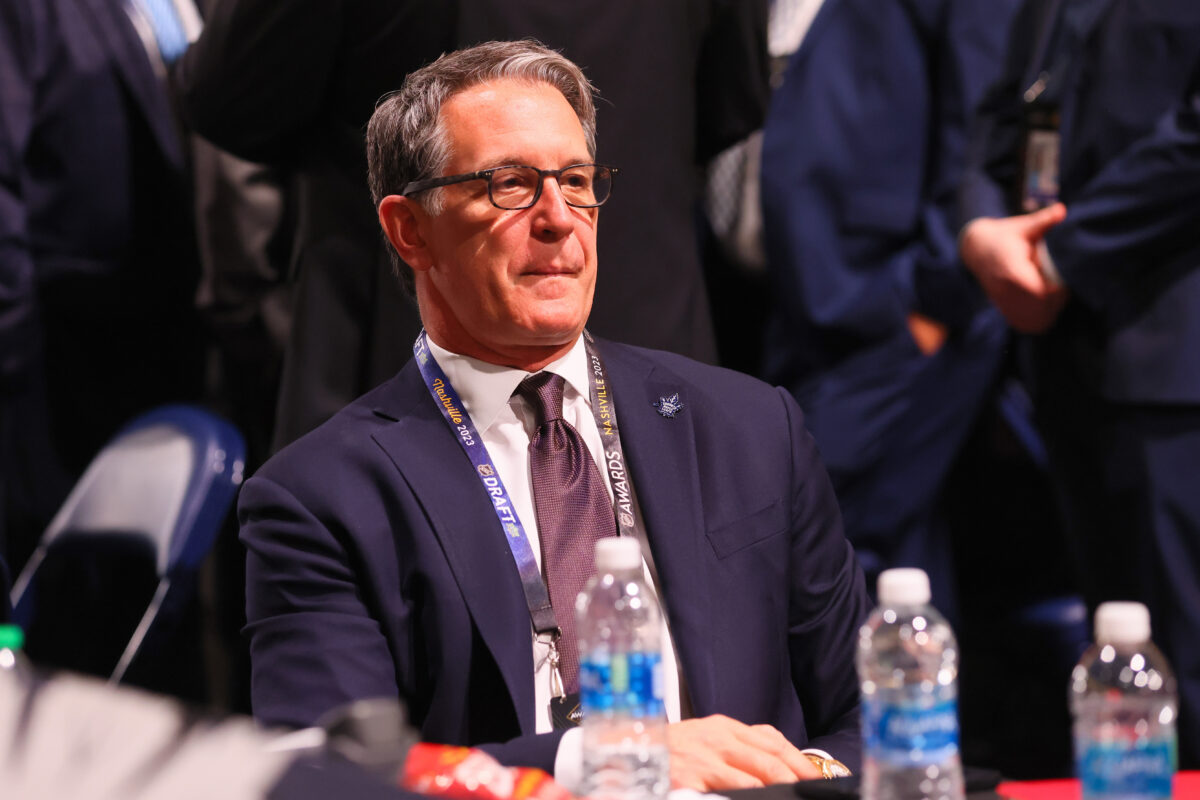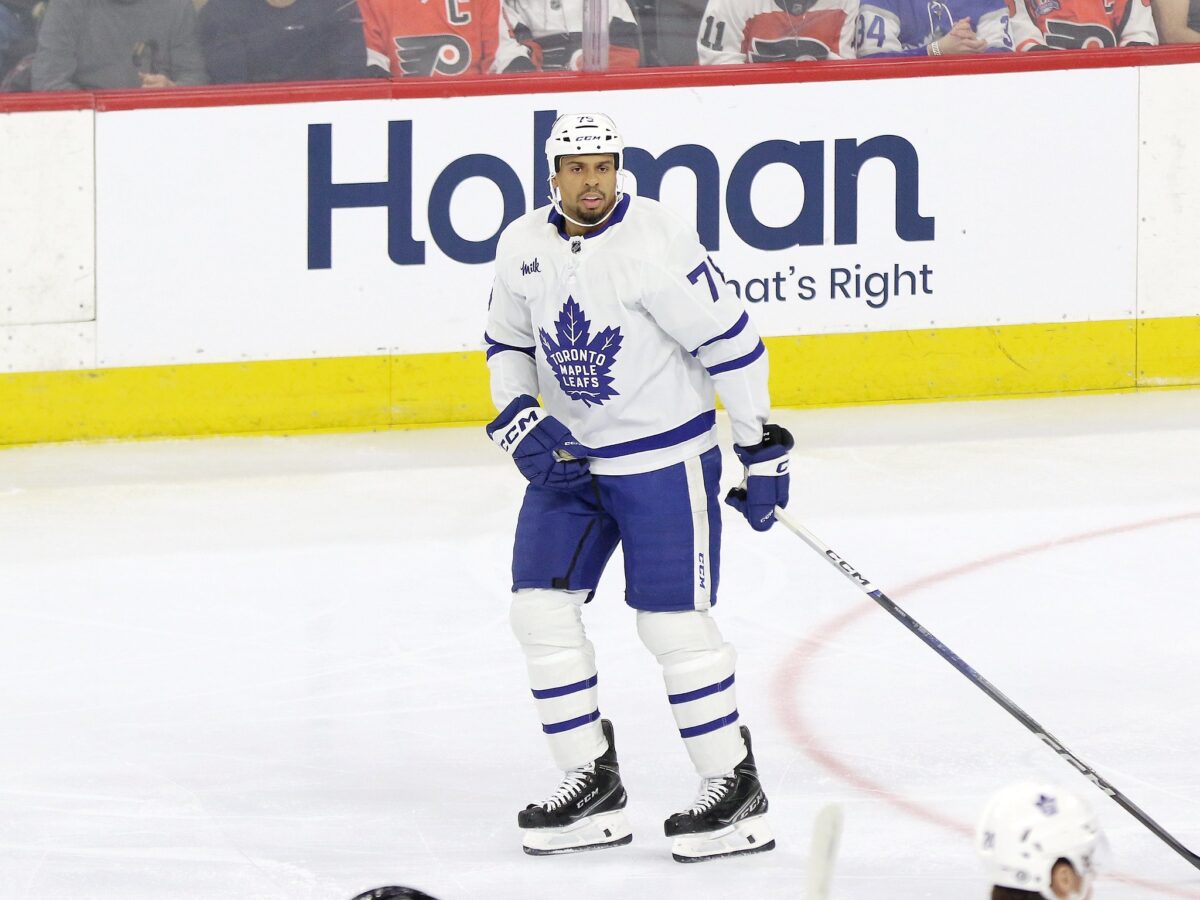After yet another disappointing end to what should have been a productive season with Stanley Cup aspirations, something big needs to change with the Toronto Maple Leafs. On a personnel level, the team composition is clearly flawed. The Core Four needs a shake-up, as it’s impossible to build a team around four players who take up half a team’s payroll, but even more so, the front office needs a complete revamp. From the top down, there simply needs to be monumental transformations done to project this team forward.
President of hockey operations Brendan Shanahan has kept the Maple Leafs from playoff success despite immense regular-season triumphs. At the same time, general manager Brad Treliving put the team in a position to leap backward in just his first season as GM. On the lower tier of front-office management, head coach Sheldon Keefe should likely get canned too, leading the team to yet another first-round exit amid questionable lineup choices and quotables that make one’s head spin.
Sheldon Keefe Should Be First to Go
The writing is unquestionably already on the wall, but Keefe should be the first member of the front office to depart from the team. His regular-season record of 212-97-40 since November 2019 is undeniably incredible. On the flipside, that regular season success has resulted in just one playoff series victory.
Questionable Lineup Decisions
Throughout the seven-game series against the Boston Bruins, there were a couple of lineup decisions that rightfully raised some eyebrows. In Game 4, Keefe benched defenceman Timothy Liljegren in favour of TJ Brodie. Liljegren had admittedly struggled in the previous game, but he was a two-way stud in the regular season and that in and of itself should warrant significant ice time. Among Maple Leafs’ defencemen with at least 500 minutes played at 5v5, Liljegren ranked second in expected goals share (xGF%), trailing only veteran Mark Giordano, at 53.09%, compared to Brodie’s 49.34%, which ranked second-worst. Unsurprisingly, the Maple Leafs lost Game 4 and Brodie went minus-2 in the box score.

In Game 7, Keefe put franchise center Auston Matthews on the third line alongside depth wingers Pontus Holmberg and Calle Jarnkrok. Unsurprisingly, the move didn’t work at all — the Maple Leafs’ xGF% while that line was on the ice was an abysmal 6.66%, meaning that the Bruins controlled almost 94% of the expected goals while that line was playing. Sure, there’s an argument for Matthews playing in that position considering he was returning from injury, but there really is no excuse for icing your undisputed best player alongside two players who combined for 38 points in the regular season. Who knows what may have happened if they top-loaded the first line like they should have for the first period and a half?
Quotes Show Cluelessness
Keefe’s words during Round 1 are also causes for major concern moving forward. On the Liljegren benching in Game 4, Keefe cited injury as the reason why he was benched in favour of Brodie. On that, Liljegren stated, “I don’t know, I feel good. I was a bit surprised (to come out) but it is what it is.” It’s one thing to bench a player due to legitimate injury and have the player agree that they’re injured, but to allegedly lie about it to cover his tracks about a decision that shouldn’t have been made seems like it’s in bad faith and should have drawn more reprehension, in my opinion.
Beyond that, Keefe’s quotes during the first round were outright head-scratching. For one, after the Game 7 loss, Keefe said, “When teams play the Leafs, they set the game up for the Leafs to beat themselves,” which, beyond not making much sense, suggests that he himself believes that the Maple Leafs are prone to making self-sabotaging mistakes, indicting himself and his own system for the reason that they can’t find playoff success. After Game 4, also a loss, Keefe said that the effort was not the problem. Instead of potentially lighting a fire under the Maple Leafs, he seemed complacent with the loss, which is equally as perplexing considering that they got outplayed in back-to-back games.
The “Shanaplan” Hasn’t Worked
Named president of hockey operations for the Maple Leafs in April 2014, Brendan Shanahan was always a proponent of process over results, something he’s outright said several times (from ‘Leafs’ latest playoff exit makes it clear: Time is up for the Shanaplan’, The Athletic, May 5, 2024″) — and that’s a great thing to hear to a point. It becomes shaky when the process hasn’t yielded any results since his hiring.

Year by year, the Maple Leafs have been regular-season juggernauts. They’ve eclipsed the 100-point mark in three consecutive seasons and have finished top-10 in the league in each of the last four. In and of itself, that should be considered a success, but it doesn’t really mean anything unless there’s playoff success to go along with it. Sure, the overarching theme of his presidency hasn’t changed — it’s still “trust the process” — but there becomes a point in time where the process needs to net some tangible results, and given that the Maple Leafs have had top-10 regular-season finishes in each of the past four years, it’s far past that time. A new president of hockey operations should be named, and one who understands that it’s go-time.
Necessity of New GM
While it’s admittedly easy to point the finger at Keefe for the results of the season and playoffs considering his choices and general outlook on the games as coach, Treliving didn’t do him any favours lineup-wise. After Kyle Dubas’ firing and subsequent replacement by Treliving in May 2023, the latter has done nothing but make questionable decisions on the roster-building front, choosing players with “grit” and “heart” over players with talent and skill.
Related: Insider Says Maple Leafs Could Leverage Marner Into a Trade
Looking back, I would argue that Treliving never should have gotten the job to begin with after Dubas was canned. His seasons in Calgary were disastrous to say the least, having won just two playoff series in nine years with the Flames. He’d made enough perplexing moves with his previous team — trading away fourth-overall selection Sam Bennett for a second-round pick and Emil Heineman, a second-round pick for 70 games of Curtis Lazar, and third and fifth-rounders in exchange for Michael Stone, for example — to put into question his hiring as Maple Leafs’ GM off the bat. His massive extension to Jonathan Huberdeau should have been a red flag for a team that has now pumped over $40 million annually into just four players, as should have his history of having a locker room with a less-than-ideal atmosphere.
Disastrous Deadline Management
This past trade deadline was bar-none one of the worst examples of roster building from a competitor I have seen at the deadline in recent years. Rather than addressing the real issues at the time — third and fourth-line scoring and puck-moving defenceman to take a bit of that pressure off of Morgan Rielly — Treliving chose to ship off a plethora of draft picks (two third-rounders, a fourth, a fifth, and two sixths) for two net-negative defencemen, a net-negative fourth-liner, and a prospect who will almost certainly never see NHL ice.
On defence, Treliving “added” Joel Edmundson and Ilya Lyubushkin, who have been widely regarded as two of the worst defencemen in the league over the past few seasons by anyone and everyone who follows players’ statistical profiles. Entering his tenure as a Maple Leaf, Lyubushkin ranked fourth-worst in the league in expected goals above replacement (xGAR) and had an abysmal xGF% of 42.30%. As for Edmundson, he had an xGF% of 46.79% with the Washington Capitals in 2023-24, much higher than the 41.71% and 41.27% xGF%s he’d posted in the two campaigns before this season.
I understand the perceived importance of adding toughness during the playoffs — the postseason is undoubtedly more physical than the regular season so there’s an inflated perspicuity for a “need” for gritty players regardless of whether or not that’s the truth. Treliving has taken that to heart season after season, and it hasn’t netted any playoff results in years. Instead of prioritizing skill throughout the lineup for a team whose best players have an immense skill ceiling and whose coach has a tendency to prioritize offence over structure, he’s scattered the identity of the team up and down the lineup, trading for players who aren’t built to complement their core. Skilled grit is always a welcome addition — defencemen like Colin Miller and Chris Tanev were right there ready to be traded for, but Treliving decided that Lyubushkin and Edmundson, players who are grittier but significantly less skilled, were better additions.
Questionable Free Agency Decisions
Aside from his cataclysmic trade history, Treliving has also dropped the ball in free agency throughout his career, and that stood true for his Maple Leafs tenure as well thus far. On the first day of free agency last offseason, Treliving inked Ryan Reaves to a three-year deal worth north of $1.3 million annually — yet another example of him preferring perceived grittiness and physicality over legitimate scoring talent for the bottom six. He followed it up with a one-year, $4 million offer to defenceman John Klingberg, widely regarded as one of the worst defensive defencemen in the NHL.
Those two signings alone should have been enough of a bad omen for fans to be on the fence about Treliving as the Maple Leafs’ GM. Reaves was quasi-useless in his first season as a Maple Leaf, dropping four goals, six total points, and an xGF% of 48.92% in 49 games. He was often sat for better, more talented options in both the regular season and playoffs, something that simply shouldn’t be happening with a player signed to a multi-year deal at a well-above league minimum. It shouldn’t come as a surprise, though — Reaves has never been an effective player but GMs around the league seem to think he’s a necessary “tough guy” who scares the opposition with his physicality and eagerness to fight.

Klingberg missed the vast majority of the season due to injury, but the signing in and of itself is a testament to Treliving’s inability to identify palatable talent. In his 14 games this season, Klingberg had five assists — two on the power play — and an xGF% of 42.02%, the worst among defencemen with at least 10 games played and second-worst on the team. Klingberg doesn’t bring any sort of edge to his game, either, so it really just was a signing that left us asking “Why?”
For a team that is going to be cap-strapped next season, his choice in low-value unrestricted free agents (UFAs) is questionable at best as well. He signed Noah Gregor to a one-year, $775,000 deal in October, and Gregor was arguably the least effective Maple Leaf of 2023-24. His six goals and 12 total points in 63 games were better than what Reaves put up, but his xGF% of 41.90% was the worst on the team. The only comparable forwards who compete with his ineffectual gameplay this season are Reaves and David Kämpf, who Treliving signed to a four-year, $2.4 million average annual value (AAV) contract last June. That contract also has a modified no-trade clause, so it’s not even like Kämpf’s horrible contract will be able to get pawned off to someone else.
In his tenure with the Flames, Treliving made many questionable calls in free agency as well. In 2016, he signed winger Troy Brouwer to a four-year, $4.5 million AAV contract — he was bought out two years later. Following Brouwer came then-31-year-old James Neal, who was signed to a five-year, $5.75 million AAV deal. Neal spent exactly one season in Calgary, scoring just seven goals and 19 points in 63 games. Other notably horrid signings in Treliving’s history as Flames’ GM include Michael Stone (three years, $3.5 million AAV), Mason Raymond (three years, $3.15 million AAV), and Deryk Engelland (three years, $2.92 million).
Treliving Should Not Be at the Helm Considering the Need for Massive Change
If there’s one thing I’m concerned about moving forward in pertinence to Treliving, it’s what he’s going to do with the roster this offseason considering that a huge change is necessary. One of the Core Four should be moved, and considering his focus on grit over skill, it’s concerning that he might be moving one of them for a package that might not include a player or players equal in talent. Especially when taking into account his management of the Matthew Tkachuk trade in Calgary, his ability to be at the helm of a team needing major changes to a core that includes four highly-paid, highly-skilled players should be questioned.
Tkachuk wanted out, sure, but the trade was a disaster in hindsight. Jonathan Huberdeau enjoyed the worst point drop-off in NHL history while getting an exorbitant eight-year, $10.5 million contract extension with a full no-movement clause for the first six years — a contract that he got offered after a clear outlier of a career year. He also reportedly offered Johnny Gaudreau a deal north of $10 million, and Gaudreau had a similar production fall-off just one season after a career year. He’s demonstrated an inability to offer star players contracts that allow some breathing room for teams to build a complete roster, something that teams like the Dallas Stars and 2021-22 Colorado Avalanche excelled at.
Complacency Would Be a Major Mistake
Standing by and doing nothing to the front office at all would be a drastic mistake for a team that has endured playoff mediocrity for half a decade — at the very least one of Keefe, Shanahan, or Treliving needs to go. A shake-up is necessary for a step forward, if anything just because the current corps has proven they don’t work. Treliving’s job is likely the safest of the three simply due to his only having one season under his belt, but he’s arguably done the worst job of the three names mentioned in his respective position. Something needs to shift monumentally, and not just on a lineup level.
